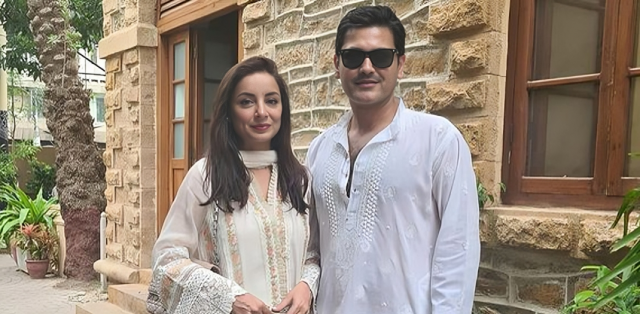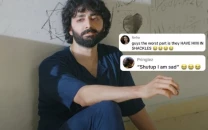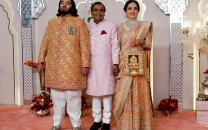Sarwat and I were always meant to be: Fahad Mirza
Doctor-actor opens up about love, life and a strong belief in God

The Pakistan film and television industry is bursting at the seams with an avalanche of talent, but few actors can boast about holding a medical degree and somehow find the time to grace the screens simultaneously.
Fahad Mirza, 42-year-old plastic surgeon-and-actor extraordinaire oozing charm and boyish good looks, sat down for a candid chat with his long-time friend Ahmad Ali Butt to discuss a smorgasbord of things, such as beauty, spirituality, politics, fatherhood, marriage, and exactly what makes Fahad tick. "I had always wanted to be a hero," he recalled. "Never a doctor."
A hero is born
Of course, Fahad’s mother had other ideas, she would tell everyone that her son, the second of four children, would be an orthopaedic surgeon. Growing up with a set of loving parents, Fahad recalled that without his mother, who drummed it into his head that he had to study or he would be out on the streets, he would not have worked hard at medicine at all.
However, being a doctor was not Fahad’s dream. To Fahad being a hero only ever meant being an actor. To be more specific, Sean Connery. Or Roger Moore. Or Pierce Brosnan. "I just wanted to be James Bond," Fahad confessed with a laugh. "Any Bond except Timothy Dalton!"
Fahad’s wish to be a hero first came true back in his days as a medical student, when he had no money but expensive tastes, such as Marlboro Lights. The then practically penniless student, travelling on rickshaws to save money, would plead with his cigarette dealer to let him play at the end of the month. "He didn’t know my name," remembered Fahad, "And I asked him how he would know it was me when the time came to pay."
Fahad got the ego boost of his life when the man whipped out his diary and showed that he had saved his name as ‘Hero’. His acting career began during his fourth year at Dow Medical College – smack in the middle of his fourth-year viva exams. "Our viva was spread out over ten days, and mine fell on the first day," explained Fahad.
This was a problem because it clashed with a scheduled photo shoot. However, by this time, Fahad, who had already had a few commercials under his belt by then, had fine-tuned his acting skills and used them to implore his professors to please send his exam to the back of the queue. To his astonishment, they agreed, and to their astonishment, he sailed through his exams with distinction. "Now I understand that maybe I was always a good student," he admitted.
Putting heroism aside
Soon, along came the opportunity for some acting roles in plays, for which Fahad credited Marina Khan and Jalil Akhtar. Acting in plays was never a well-paid job, nor indeed as heroic as Fahad imagined, but Fahad rose above his thirst for heroism. Besides, at the time, with Fawad Khan taking Pakistani television by storm with his role in Humsafar, Fahad began to understand that perhaps acting was a viable option for people like him.
"That was a watershed moment for us, for our generation," recalled Fahad in awe. "That was a turning point. It could be good enough for us. Educated people with good prospects could do this." Good things have certainly happened to Fahad Mirza. "I don’t find plays," he said. "They find me!"
A role in Parizaad also managed to find its way to Fahad, which he was sceptical about accepting until a bizarre encounter he had with a man in a shop at Lahore airport.
"I had a headache," recalled Fahad with a laugh, "And I wanted to buy Panadol, but the guy behind the counter just wouldn’t look up from his phone." Indeed, the man, once his attention had been wrested away from his phone, shot Fahad a look of pure loathing – ‘like a French waiter!’ – for interrupting him.
"If looks could kill, I’d have been killed," was how Fahad poetically put it. It transpired that the man, of course, was watching Parizaad on his phone. Jokingly, Fahad asked him if he should take up a part. "Fine, do it!" snapped the man, before returning to his phone for the final time.
Love is all that matters
In addition to having a host of adoring fans, Fahad has also been lucky in love in his personal life. He met his wife, Sarwat, a then Indus Valley student, in 2001, and it was not long before he knew she was the one for him.
"Sarwat had great energy," remembered Fahad, who had been actively trying to mingle with ‘cool, hip’ girls from Indus Valley at the time after a lifetime of studying at boys-only schools. When they reconnected years later, Fahad knew that they belonged together. “Everything was aligned. We were always meant to be. She is an independent, liberated, free woman, but still chooses to make an effort to wait up for me after I’ve been away at work all day.”
One piece of relationship advice Fahad had was to allow couples to have ‘me time’ to unwind after a busy day at work. "It takes small micro efforts. I love to read and scroll through my phone. Sometimes I need that time to myself at the end of the day." However, both Fahad and host Ahmad Bhatt bounded over the knowledge that men like them needed strong women like their respective wives to keep them grounded.
When asked if fatherhood had changed him, Fahad, recalled that initially, he wasn’t at all ready for the impending arrival of his first child. However, the women in his life calmed him down, and once the baby was born, Fahad marvelled over the fact that he could have been so panicked about something so wonderful as his child.
Dance with the divine
Having a spiritual outlook has been something that has been with Fahad all his life, ‘blood and bone’, and has only strengthened over time. "I believe in God because I need to know there is someone out there looking out for me. This body is temporary. Our soul is the driving force. We are infinite. This life is a temporary phase. It is a test. The life on this earth is nothing but an illusion, like a 3D video game."
A spiritual connection has helped him understand the religious struggles of Imam Hussain and the people around him and likened it to the current atrocities happening around the world. "My respect for Imam Hussain has multiplied a billion times over. He could not walk away. Now I know he had no choice but to walk into that death trap."
Have something to add? Share it in the comments





-(1)1720859193-0/Untitled-design-(83)-(1)1720859193-0-208x130.webp)













COMMENTS
Comments are moderated and generally will be posted if they are on-topic and not abusive.
For more information, please see our Comments FAQ